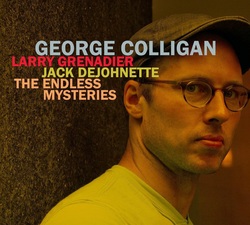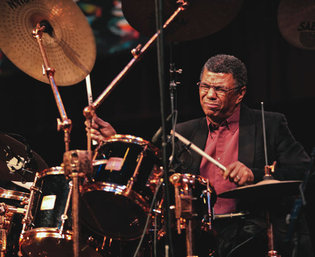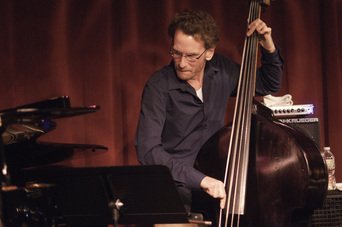
George’s relationship with DeJohnette began years ago when George was subbing in a rehearsal session for him. The way George describes it in his liner notes is that George made Jack keep his phone number and--in 2009--Jack called him to come aboard and George has been a part of Jack’s group since then.
The album was recorded at NRS Studio in Catskill, NY on December 18, 2012. That date will play a part in the story of the album.
Maybe it is the December setting that makes the first track “Waiting for Solitude” sound like a soundtrack for a wintry night with snow falling outdoors. The delicate introduction from George’s piano creates just such an image. Larry Grenadier and Jack DeJohnette join in with the same light touch. Grenadier gets a good solo in the piece and shows himself sublimely comfortable in this group.
Then DeJohnette opens “Song for the Tarahumera” with a quick-step pacing and is joined in the fast pacing by piano and drums. The Tarahumera are a Native American tribe in northwestern Mexico and are renowned for their barefoot long-walks, sometimes covering as much as 100 miles in a day. The piece is indeed a barefoot stride of light-hearted optimism and engagement. DeJohnette is brilliant as always and is a great contributor to the flow and feel of the piece.
“Her Majesty” confirms my appreciation for Colligan not just as a performer but as a composer. It is an extremely well-constructed piece with well-timed stops and smooth flowing bass lines. The song truly allows the trio to show how well-suited they are to interacting with each other.

“Her Majesty” allows for that display. I’m not sure if the piece is inspired by Colligan’s wife--the talented and adorable Kerry Politzer--but it is certainly an inspired and inspiring piece.
“Liam’s Lament” is launched by Grenadier’s bass. It is very subtle introduction. This is the third setting in which I have heard this particular piece, dedicated to George’s son when the boy was only two years old.
The first setting was a YouTube video featuring Boris Kozlov on bass. The second was with George’s quartet at a live performance in Portland, OR in May of 2012 with Eric Gruber on bass and Todd Strait on drums. Kozlov had played electric bass while Gruber (and now Grenadier) played the double-bass. Each of the three performances carry their own characteristics and particular strengths but this recording of the piece may be the crowning achievement.
The song features George on the melodica with its own peculiar sound under George’s touch. He carries that haunting melody as Grenadier and DeJohnette contribute their own uniqueness. At 1:30 in the track, Grenadier strikes a doubled note that made me rewind it several times to hear it again and again. It was a sound that added so much and yet in a minimal way.
Todd Strait had gone to the brushes on the piece in the live performance but DeJohnette equals that light touch with the sticks. His light cymbal work makes this remarkable piece even more remarkable.
| | |
“It’s Hard Work!” is a composition closely coupled with “Lydian Domination” from George’s 2013 album entitled “The Facts.” The former’s bass line is very reminiscent of the latter piece but the piano melody is from a completely different place. The bass groove is a thing of beauty. The track itself is very well placed behind “Liam’s Lament.”
 The Master, Jack DeJohnette
The Master, Jack DeJohnette “Thoughts of Ana” is a memory of Ana Marquez-Greene. She was the first-grade daughter of saxophonist and former Colligan colleague, Jimmy Greene. The song is heart-rending in its fragility and innocence. The images of the children’s faces march across the memory while the heroic sacrifice of the teachers and school staff stirs the indignation and fury at policies and politics that bemoan but do not amend the laws that allow for such evil.
George’s solo piano carries the sad imagery and the song fades out with the piano’s highest note struck in intervals like little souls moving heavenward. And that gives way to…
“Outrage.” It is the piano again leading in with a cacophonous anger. Grenadier’s bass adds its voice to be followed by DeJohnette’s indignant drums; a chorus of condemnation against monstrosity and moral evil. Not just the evil of action but the equal evils of inaction and service to greed. It is a piece that empties the emotions.
“The Endless Mysteries” attempts to heal and feels like a psalm of existence. It carries with it an honor for life and a recognition of not-knowing. Perhaps it is because of the previous two pieces that the song makes one thankful that--though we despise and regret the loss of those little martyrs and their guardians--there is thanksgiving that they graced our planet at all. They were here, if only for a little while, and we should be grateful.
 Larry Grenadier
Larry Grenadier And it works so well. After all, Colligan has served as DeJohnette’s pianist for four years now. DeJohnette himself is a splendid pianist and understands how his drumming should interact with George’s piano. This is indeed a stand-out piece.
“If the Mountain Were Smooth, You Couldn’t Climb It” is a superb end to this album of joy and heart-break. This song is a summary of the message of the album--a song of what life is. The album covers the craggy and painful parts of life and it ascends to the heights of joy.
The performance is incredible, on this piece and on the whole album, and the composition is brilliant. It is the best possible way to close out the album. So life-affirming. So uplifting. It is almost as if the three of them were pouring out everything on this final track and they are just on fire.
I have heard all of George Colligan’s recordings and I have always enjoyed his performances, both heard recorded and experienced live. “The Endless Mysteries” is the best thing he has yet done. What excites me most is that he is not finished.
George Colligan's "The Endless Mysteries" can be purchased at Origin Records here.
 RSS Feed
RSS Feed
